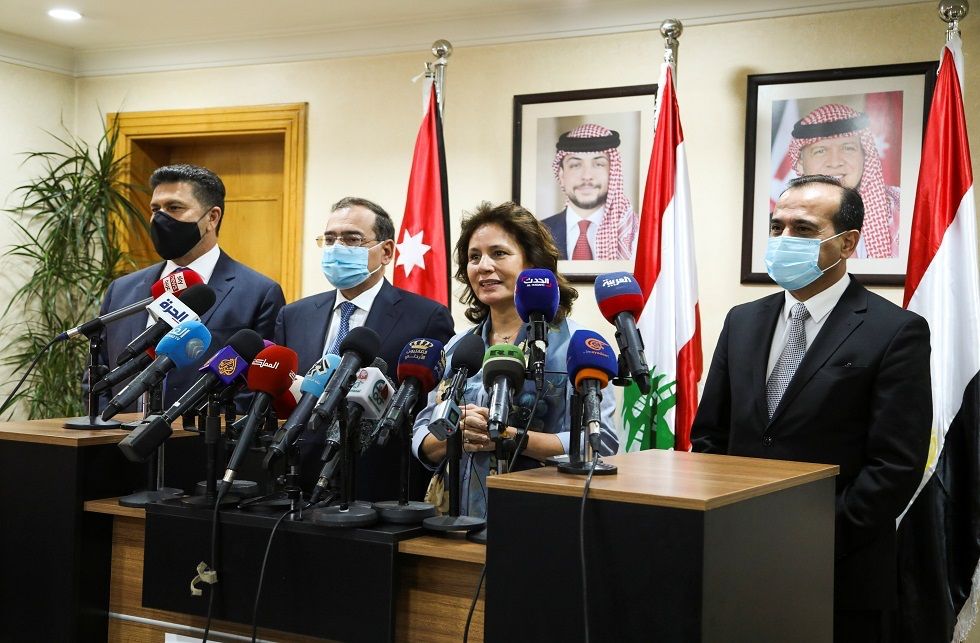A quadrilateral ministerial meeting was held on September 8 in the Jordanian capital Amman between Jordan, Egypt, Syria, and Lebanon to discuss the transfer of Egyptian gas to Lebanon through Syrian and Jordanian territories. The meeting concluded with an agreement between the four sides to present an action plan and timetable for the swift transport of gas to Lebanon, by reviving the Arab gas and electricity pipeline, which has been suspended since the end of 2011. The outcomes of the meeting are of particular importance given the efforts to resolve the current fuel crisis in Lebanon. Additionally, Arab countries are trying to counteract the Iranian role in Lebanon, especially after Hezbollah announced on August 19 the start of fuel imports from Iran.
Main outcomes of Jordan meeting
The meeting was attended by Jordanian Minister of Energy Hala Zawati, Egyptian Minister of Petroleum and Mineral Resources Tarek El Molla, Syrian Minister of Oil and Mineral Resources Bassam Tehme, and former Lebanese Minister of Energy and Water Raymond Ghajar.
In a press conference after the meeting, Jordanian Energy Minister Hala Zawati indicated that, “The aim of the meeting, which includes the Arab Gas Pipeline countries, is to resume the provision of Egyptian gas to Lebanon after a nearly decade-long interruption,” adding that “The infrastructure of the Arab Gas Pipeline is almost ready but requires some repairs as it has not been used for transport to Lebanon for a long time”. The agreements will be reviewed within 3 weeks, and the Jordanian minister pointed out that, “Each country will bear the cost of the necessary repairs to its infrastructure.”
Significant implications of Arab pipeline agreement
Despite the technical nature of the meeting of the Arab Gas Pipeline countries in Amman, there are also important political dimensions that impact current regional conditions. In this regard, there are a number of key implications of the meeting, which include:
- Resolving the Lebanese fuel crisis: The meeting sought to reduce the severity of the fuel crisis in Lebanon, which has deepened significantly over the past months in light of the country’s current severe economic crisis. Government utilities stopped supplying electricity to many areas, prompting individuals to search for the fuel needed to operate backup generators. In parallel, fuel smuggling increased and the black market expanded. On August 12, the Central Bank of Lebanon announced that it could no longer subsidize fuel imports at a preferential exchange rate, after which there was a significant increase in fuel prices.
During the meeting, former Lebanese Minister of Energy and Water Raymond Ghajar referred to the importance of transporting gas to Lebanon at the present time, as he expressed Lebanon’s urgent need to support its vital sectors such as electricity, whether through gas or direct electric power. He noted, “This is the first step from which Lebanon will benefit, through the supply of the Deir Ammar plant, which needs 600 million cubic meters of gas to generate 450 megawatts of electricity.” He added that the Lebanese government is currently working with the World Bank to secure financing for Egyptian gas, noting that “There is a possibility in the future to import electricity from Jordan through Syria after repairing some areas that were damaged by the war in Syria.” - Support for the Najib Mikati government: The timing of the Amman meeting reflects Arab support for the Lebanese government headed by Najib Mikati, which was announced on September 10th , to help Lebanon out of the power vacuum created by Prime Minister Hassan Diab’s resignation after the Beirut Port explosion on August 4, 2020. Mikati’s announcement of the formation of the new government, just two days after the Amman meeting, is likely to give momentum for the implementation of the agreements reached in the Amman meeting. Lebanon is required to ensure the readiness of its infrastructure and report any obstacles within two weeks, and the Lebanese government may need to contract external parties with the necessary technical capabilities in this regard.
- Counteracting Iranian regional influence: The meeting also serves as an attempt to counteract Iranian influence in Lebanon, as the move to revive the Arab gas pipeline was announced after Hezbollah Secretary-General Hassan Nasrallah moved in August to secure supplies of gas and diesel from Iran. Nasrallah warned the United States and Israel that “The ship (carrying the supplies) will be considered Lebanese territory as soon as it sails.” Therefore, the Amman agreement would provide an alternative, undermining Hezbollah’s use of the energy card to enhance Iran’s presence in Lebanon. Hezbollah also wishes to improve its image after the escalation of resentment towards it within Lebanon, as it has been accused of causing the current crises in partnership with established political elites. There are attempts to link the group to the Beirut Port explosion on August 4, 2020, and criticisms that its foreign policy is a tool to serve Iranian interests, that does not take into account the interests of the Lebanese state.
- Reducing the isolation of the Syrian regime: The meeting indicates a reduction in the level of regional and international isolation imposed on the Syrian regime for many years. On September 4, a Lebanese ministerial delegation headed by the Deputy Prime Minister, Minister of Defense and Minister of Foreign Affairs in the former Lebanese caretaker government ,Zeina Akar, visited Damascus in the first official visit at this level between the two countries since 2011. The two sides discussed the issue of transporting Egyptian gas to Lebanon. After the meeting, the Syrian government announced that it welcomed Lebanon’s request to import Egyptian gas to generate electricity through its territory. In a meeting with Lebanese party leaders in Damascus on September 5, Syrian President Bashar al-Assad stressed Syria’s support for the Lebanese people.
- Strengthening Arab cooperation: It was noteworthy that the Amman meeting came shortly after the participation of major Arab countries in the Baghdad Summit for Cooperation and Partnership, which was held on August 28, and reflected the interest of those countries in strengthening relations with Iraq, and supporting the efforts made by the Mustafa Al-Kadhimi government to consolidate domestic security and stability. Prior to this, Arab countries began to engage in cooperation projects with Iraq to support its efforts in dealing with the persistent problems it faces. This was evident in the tripartite summit held in Baghdad on June 27, which included Egyptian President Abdel Fattah Al-Sisi, Jordanian King Abdullah II, and Iraqi Prime Minister Mustafa Al-Kadhimi.
It can be said that these developments indicate a trend led by leading Arab countries to support countries facing crises at various levels, as this represents an important tool to strengthen Arab cooperation and solidarity, as well as confronting meddling by non-Arab actors in the Arab region.


